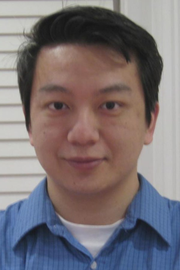
Our research focuses on the molecular mechanism of membrane channels, receptors, and transporters. We have been using solution NMR spectroscopy to study these proteins, while pushing the technological envelope to enable NMR characterization of the structure and dynamics of more complex membrane systems.
Currently, my lab has three major aspects of research. One aspect is the structure and mechanism of viral ion channels. Our recent work on influenza proton channels have established a general NMR approach for characterizing the structures of viral channels, and for understanding the structural basis of drug inhibition and drug resistance. The long term goal is to develop novel antiviral therapeutics that target these viral channels.
Another aspect is structural study of transmembrane receptors. The membrane-associated regions of immunoreceptors have long been the blind spot of structural biologists. We have developed, in collaboration with Kai Wucherpfennig, a powerful NMR/Biochemistry approach that enabled structure determination of the transmembrane domains of the homodimeric zz of TCR-CD3 and the heterotrimeric DAP12-NKG2C receptor complex. Moreover, combination of NMR and lipid/detergent bicelle technology allowed us to obtain the structure of the tyrosine-based activation motif associated with membrane, providing new insights into the mechanism of signal transduction across the membrane. We are working towards obtaining a complete view of the assembled TCR-CD3 complex.
Finally, a new direction in the lab is using solution NMR spectroscopy to discover mechanisms of membrane-embedded transporters and translocators. We have recently developed a new NMR protocol that enabled structure determination of UCP2, a 300-residue proton translocator in the inner membrane of mitochondria that resisted years of crystallization effort. The new development, which includes fabrication of DNA nanotubes and RDC-based molecular fragment replacement, overcame many technical challenges involved in solving large membrane proteins by conventional NMR methods. We are now applying the technology to other medium-sized transporters to probe conformational changes coupled to substrate transport.
Source: http://chou.med.harvard.edu/links.htm